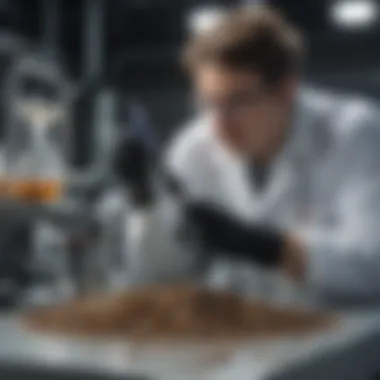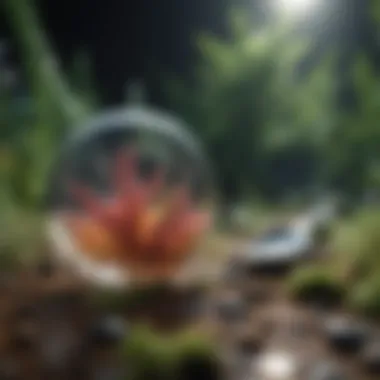Career Pathways in Environmental Microbiology


Intro
The field of environmental microbiology is an expansive and crucial domain within the sciences. It merges foundational knowledge in microbiology with the pressing issues facing our ecosystems today. As concerns regarding climate change, pollution, and biodiversity loss grow, the role of environmental microbiologists becomes ever more critical. This article serves as a detailed roadmap for those considering a career in this field. It will elucidate job opportunities, necessary qualifications, and the skills that professionals need to be effective.
Understanding the landscape of career pathways in environmental microbiology necessitates a thorough examination of various roles available. Whether working in academia, industry, governmental, or non-governmental sectors, professionals can engage in diverse tasks such as ecological monitoring, bioremediation, or research on microbial communities. By delving into these aspects, we aim to create a strong foundation for students and professionals who aspire to navigate this intricate job market.
Research Overview
Summary of Key Findings
Environmental microbiology is not just about the study of microorganisms in the environment; it also encompasses their interactions with each other and their impact on ecosystem health. Key findings from recent studies indicate a growing demand for experts in this area. Job postings reveal a trend favoring candidates skilled in molecular biology, bioinformatics, and environmental science. Moreover, the integration of microbiomics in environmental management is an emerging trend that professionals should be aware of.
Relevance to Current Scientific Discussions
Discussions surrounding environmental challenges and microbiological solutions are increasingly prominent. For example, the role of microbiota in carbon cycling is often debated in scientific circles. Understanding these interactions sheds light on how microbial processes can mitigate climate change effects. By staying attuned to current discussions, professionals can ensure they remain relevant in a quickly evolving field.
Job Roles in Environmental Microbiology
While exploring potential career options, it is essential to understand the various job roles available in the sector. Some key roles include:
- Research Scientist: Engaging in laboratory and field research to study microbial processes.
- Environmental Consultant: Advising organizations on environmental policies and compliance.
- Biotechnologist: Developing microbial solutions for environmental problems.
- Policy Maker: Crafting regulations related to microbial health and environmental protection.
These roles often necessitate collaboration across disciplines, indicating the multifaceted nature of environmental microbiology.
Skills Required
Success in this field demands a unique skill set, which includes but is not limited to:
- Proficiency in laboratory techniques and equipment
- Strong analytical skills for data interpretation
- Effective communication skills for report writing and presentation
- Understanding of microbial ecology and environmental systems
These skills are essential, as they facilitate effective research contributions and engage with broader societal challenges.
Culmination
As we navigate the detailed narrative of career pathways in environmental microbiology, it is evident that this field holds vast potential. Graduates entering this workforce will find numerous opportunities but must also prepare for evolving challenges. By understanding job roles, required skills, and emerging trends, aspirants in environmental microbiology can approach their careers with confidence.
Prolusion to Environmental Microbiology
Environmental microbiology plays a vital role in understanding and managing the interactions between microorganisms and their environments. This fundamental field encompasses various disciplines that examine how microbes influence ecosystems, public health, and biogeochemical cycles. The importance of this topic cannot be overstated, especially given the current global challenges related to climate change, pollution, and biodiversity loss.
In this article, we focus on the career pathways available in environmental microbiology, offering insights into the types of jobs, necessary qualifications, and essential skills that professionals should develop. By exploring this subject, we aim to provide a comprehensive overview that can guide students, educators, and practitioners interested in this domain.
The application of microbial processes within environmental contexts has many benefits. These range from developing bioremediation strategies to restoring polluted ecosystems, to enhancing agricultural productivity sustainably. Understanding these processes naturally leads to an awareness of the career opportunities available, which can be varied and rewarding. As we delve into the specific aspects of environmental microbiology careers, we highlight the significance of this field in addressing pressing global issues.
Types of Jobs in Environmental Microbiology
The field of environmental microbiology offers a wide variety of career opportunities. Understanding the types of jobs available is crucial for anyone interested in pursuing a career in this area. By knowing the specific roles and their requirements, individuals can better prepare themselves and leverage their skills strategically. Each job type impacts both the environment and human health, emphasizing the importance of microbiology in larger global contexts.
Research Scientist Roles
Research scientists in environmental microbiology primarily work in laboratories or academic institutions. Their focus is on understanding microbial processes and their effects on ecosystems. They conduct experiments, analyze data, and publish findings to advance knowledge in the field. Typically, these roles require advanced degrees, such as a PhD, due to the technical expertise needed. Skills in project management, critical thinking, and experimental design are also crucial for success.
Environmental Consultant Positions


Environmental consultants play a vital role in advising businesses and government agencies on microbiological issues. They assess the impact of projects on microbial ecosystems and help design strategies to mitigate negative effects. These professionals often hold degrees in environmental science or microbiology and benefit from certifications in environmental management. Excellent communication skills are essential, as consultants must convey complex information to clients who may not have a scientific background.
Laboratory Technician Careers
Laboratory technicians support research and environmental testing by performing routine analyses and conducting experiments. These roles are fundamental for collecting data on microbial populations and their interactions with the environment. A bachelor's degree in microbiology or a related field is typically necessary, along with strong technical skills in lab equipment operation. Attention to detail is key, as even small errors in testing can lead to inaccurate results.
Regulatory Affairs Specialist
Regulatory affairs specialists ensure that organizations comply with environmental laws and regulations. They are responsible for navigating the complex legal landscape surrounding microbiological applications in industry. This role requires a solid understanding of both microbiology and law, making a unique educational background necessary. Effective negotiation and advocacy skills are important for representing the organization's interests in regulatory discussions.
Field Sampling and Analysis Technician
Field sampling and analysis technicians work outdoors, collecting samples from various environments to analyze microbial content. Their roles are essential for monitoring ecosystem health and identifying pollution sources. They often collaborate with researchers and environmental agencies. Usually, an associate's degree or relevant training is sufficient for entry-level positions. Physical stamina and comfort in various outdoor settings are necessary traits for this job.
Educational Pathways
Educational pathways play a crucial role in shaping careers in environmental microbiology. The field requires a strong academic foundation as well as specific skills to address pressing environmental issues. A thorough understanding of relevant subjects like microbiology, ecology, and environmental science is essential. Furthermore, the educational experiences not only equip students with knowledge but also provide practical skills necessary for professional success.
Investing in education in environmental microbiology opens a myriad of opportunities. Employers often look for candidates with recognized degrees that highlight their expertise. Customized programs in undergraduate and graduate studies help individuals tailor their learning to meet specific career goals. Moreover, professional development and certifications can enhance one's resume, making them stand out in a competitive job market.
"Education is the most powerful weapon which you can use to change the world." – Nelson Mandela
Undergraduate Programs
Undergraduate programs provide the foundational knowledge vital for a career in environmental microbiology. A Bachelor’s degree in biology, environmental science, or microbiology is often a starting point. These programs typically include coursework in general biology, chemistry, and specific classes focused on microbiological techniques.
Additionally, many universities offer specialized undergraduate degrees in environmental microbiology. Students gain firsthand experience through laboratory work, field studies, and research projects. This mixture prepares graduates for entry-level roles and internships, setting the stage for future career advancement.
Graduate Studies
Pursuing graduate studies is critical for those aiming for higher-level positions in environmental microbiology. Master's programs provide in-depth knowledge and an opportunity to engage in specialized research. These programs often include coursework in environmental policy, advanced microbiology, and statistical analysis, along with thesis work.
Doctoral degrees can further contribute to expertise in the field, enabling professionals to lead significant research initiatives or teach at the university level. A Ph.D. is increasingly sought for roles that involve pioneering research and development in microbial ecology or environmental management.
Professional Development and Certifications
Ongoing professional development is vital in the ever-evolving field of environmental microbiology. Certifications from recognized organizations, such as the American Society for Microbiology or the National Environmental Health Association, can enhance a professional's credibility. These certifications often cover specialized areas such as water quality analysis or environmental assessment.
Participating in workshops, conferences, and webinars is also a good practice. These opportunities enable professionals to stay updated on the latest advancements and network with peers. By committing to lifelong learning, individuals can ensure they remain relevant and competitive in the job market.
Key Skills Required
In the dynamic field of environmental microbiology, possessing the right skills is fundamental for individuals aiming to excel. These skills are not just supplementary; they form the bedrock upon which successful careers are built. A comprehensive understanding of key skills required for professionals in this field can greatly enhance one's job prospects and performance in various roles.
Technical Skills
Technical skills encompass a range of competencies essential for conducting experiments and utilizing specialized equipment. Individuals must be proficient in laboratory techniques, including PCR (polymerase chain reaction), soil sampling, and microbial culturing. Adeptness with software tools for data analysis, such as R and Python, is also increasingly important. These capabilities allow environmental microbiologists to interpret complex data sets and provide meaningful insights into microbial functions in ecosystems.
Furthermore, understanding biosafety protocols is crucial. Compliance with these guidelines ensures safe handling of microbes, which can be critical for protecting both the researcher and the environment. As technology continues to evolve, staying updated on the latest tools and methods is vital for ongoing professional development in environmental microbiology.
Analytical Thinking
Analytical thinking is a pivotal skill that enables environmental microbiologists to systematically evaluate data and troubleshoot problems. Professionals in this field often encounter complex biological systems where numerous variables interact. Thus, the ability to analyze and synthesize information is essential. For instance, when assessing the impact of pollutants on microbial communities, scientists need to discern patterns from data collected in the field.
Critical thinking supports decision-making processes, whether in research design or interpreting experimental results. Professionals must ask pertinent questions and evaluate hypotheses rigorously. Growth in analytical proficiency can lead to innovative solutions to pressing environmental issues, which fosters the advancement of sustainable practices within the field.


Communication Skills
Effective communication skills are indispensable in environmental microbiology. Professionals must convey complex scientific concepts to diverse audiences, including policymakers, stakeholders, and the general public. Written communication, such as research publications and reports, needs to be clear and concise to ensure findings are accessible to all.
Moreover, verbal skills play a key role in collaborative projects. Teamwork is often necessary for successful outcomes, and being able to actively listen and articulate ideas effectively enhances group dynamics. Public engagement is also vital, as environmental microbiologists often advocate for policies that protect ecosystems.
"Strong communication skills are the bridge between scientific knowledge and community understanding."
Engaging in outreach initiatives also builds awareness of environmental microbiology's significance. This aspect of the profession can lead to greater public support for necessary funding and policy changes, thus forming an integral part of a microbiologist’s responsibilities.
In summary, acquiring robust technical skills, fostering analytical thinking, and honing communication abilities form the essence of a successful career in environmental microbiology. Focusing on these skills will aid professionals to not only navigate their roles effectively but also contribute significantly to addressing global environmental challenges.
Industry Sectors for Employment
Understanding the industry sectors for employment in environmental microbiology is essential for anyone looking into this career path. Each sector offers unique opportunities and challenges that can shape one's career trajectory. The demand for professionals in this field is growing as global concerns about environmental health intensify. The primary sectors where environmental microbiologists find work are government agencies, non-governmental organizations, and private sector companies. Each of these areas contributes to advancing knowledge, tackling environmental issues, and providing essential services.
Government Agencies
Government agencies play a critical role in environmental microbiology. They enforce regulations designed to protect public health and the environment. Environmental microbiologists in this sector often work with organizations like the Environmental Protection Agency or local health departments. Their tasks can include:
- Conducting research on pollution impacts
- Developing standards for water and air quality
- Monitoring environmental changes.
These roles are significant because the work done shapes policy decisions. Additionally, there are opportunities to influence public health regulations, which can have far-reaching impacts. Working in government may also provide stability and benefits often missing in private sector roles.
Non-Governmental Organizations
Non-governmental organizations (NGOs) contribute to environmental microbiology by addressing specific concerns related to public health, biodiversity, and conservation. These organizations focus on advocacy, education, and research. Professionals in NGOs may:
- Lead projects aimed at pollution reduction
- Conduct community awareness campaigns
- Research innovative solutions to environmental problems.
Working in an NGO allows environmental microbiologists to pursue their passion while addressing significant social issues. The impact of their work can be immediate and tangible, often leading to community or global initiatives. Moreover, the work environment is often more dynamic, appealing to those who thrive in less formal settings.
Private Sector Companies
The private sector offers a broad array of opportunities for environmental microbiologists. Companies involved in biotechnology, pharmaceuticals, and environmental consulting are keen to employ professionals in this field. In these environments, responsibilities can include:
- Developing new bio-remediation technology
- Ensuring compliance with environmental laws
- Conducting risk assessments.
The drive for corporate responsibility and sustainability is increasing. As a result, private companies invest in teams dedicated to environmental microbiology. This sector often provides higher salaries and growth opportunities but may come with pressures like meeting strict deadlines or working within corporate frameworks.
Each industry sector presents its own set of benefits and challenges. Identifying the right fit for one's skills and career aspirations is crucial for success in environmental microbiology.
Emerging Trends
Emerging trends in environmental microbiology are pivotal for understanding the future landscape of the field. These trends reflect shifts in technology, priorities, and global challenges that emphasize the significance of microbiological research and practices. As environmental concerns grow, staying ahead of these trends is essential for professionals navigating their careers within this discipline.
Advancements in Technology
Recent advancements in technology have transformed research methodologies in environmental microbiology. Innovations such as high-throughput sequencing and metagenomics allow for comprehensive analysis of microbial communities in different environments. This technology enables researchers to identify and characterize microbial populations with unprecedented accuracy.
- Data Management: The massive influx of data generated by these technologies necessitates robust data management and analytical tools. Software like QIIME and MEGA facilitate the analysis, aiding scientists in drawing meaningful conclusions from their findings.
- Remote Sensing: Another critical advancement is the growth of remote sensing technologies. These tools allow for the monitoring of environmental parameters over large areas, facilitating quicker responses to ecological changes.
This technological evolution emphasizes the need for professionals in this field to possess both technical and analytical skills. Familiarity with bioinformatics, data analysis, and environmental monitoring tools will be crucial in addressing ongoing and future ecological challenges.


Sustainability Focus
Sustainability has become a cornerstone for many sectors, including environmental microbiology. The focus on sustainable practices addresses the urgent need to balance human activities with ecological preservation. Environmental microbiologists play an essential role by developing sustainable biotechnological solutions.
- Bioremediation: One emerging area is bioremediation, which leverages microbial processes to clean up contaminated environments. This approach not only resolves pollution issues but also minimizes the ecological footprint of clean-up efforts.
- Waste Management: Additionally, sustainability encompasses better waste management practices. Microbial technologies are increasingly utilized to convert waste into energy or valuable resources, fostering a circular economy.
"The integration of sustainability principles into environmental microbiology encourages a proactive stance toward ecological challenges, promoting a healthier planet for future generations."
Organizations are now prioritizing sustainable practices in their operations. As a result, professionals equipped with knowledge and skills in sustainability metrics will be highly sought after in various job sectors, from government agencies to private firms. Bridging technology and sustainability will shape the careers of those entering this field, highlighting its importance in today's world.
Challenges in the Field
Environmental microbiology is a discipline that faces numerous challenges, impacting its growth and effectiveness. Examining these challenges offers insights into the hurdles professionals must navigate. Recognizing these obstacles is crucial as it informs strategies for overcoming them, ensuring the discipline can continue to advance and respond to future demands.
Funding and Resource Limitations
One of the most significant challenges in environmental microbiology is the issue of funding. Many research projects rely on grants from governmental organizations, non-profits, or private sector sources. Unfortunately, in recent years, many funding bodies have seen reductions in their budgets. This decline can lead to inadequate resources for essential research initiatives.
With limited funding, researchers may be forced to prioritize certain studies over others. This situation can restrict innovation and slow the progress essential for combatting environmental issues. Moreover, projects that aim to conduct long-term studies may find it difficult to secure continuous funding, leading to gaps in research. As a result, the overall impact of environmental microbiology on real-world problems may be diminished.
Key points include:
- Short-term grants can limit the scope of research.
- Essential projects may be put on hold due to funding gaps.
- Innovative solutions may not receive the attention they require due to budget constraints.
Public Awareness and Misconceptions
Another challenge is the public's understanding of environmental microbiology. Many people have misconceptions about bacteria and other microorganisms. Often, these organisms are viewed solely as harmful agents, neglecting their vital role in ecosystems. This misunderstanding can affect public support for research initiatives and policy decisions related to environmental microbiology.
When the public lacks awareness, it becomes difficult to advocate for necessary funding and resources. For instance, understanding the importance of microbial activity in nutrient cycling and soil health is essential for promoting sustainable agriculture. Furthermore, misinformation can lead to resistance against projects that aim to restore ecosystems or mitigate pollution.
Efforts to educate the public about the benefits of environmental microbiology can transform perceptions and encourage more support for related initiatives.
Some important elements to consider are:
- Educational campaigns can help inform the public about microbial roles in ecosystems.
- Misconceptions can hinder cooperation between scientists and communities.
- Increased public interest can lead to better funding and resource allocation.
"Addressing misconceptions in the public sphere is as crucial as addressing the scientific challenges faced in the lab."
Understanding these challenges is essential for those considering a career in environmental microbiology. They must be prepared to advocate for their work and promote awareness about its significance in society.
Closure and Future Outlook
In the ever-evolving field of environmental microbiology, the future holds numerous pathways for both current and prospective professionals. Understanding this field's trajectory is essential, as it allows practitioners to adapt and thrive amid shifts in technology, public policy, and societal expectations. This section assesses the opportunities available and outlines the significant impact environmental microbiologists have on addressing critical issues.
Summary of Opportunities
Professional prospects in environmental microbiology are diverse and growing. Key opportunities include:
- Research positions at universities and governmental agencies focusing on microbial ecology.
- Consulting avenues for organizations looking to mitigate environmental impacts and enhance sustainability practices.
- Laboratory careers that get involved with analyzing microbial populations and their effects on ecosystems.
- Field roles that emphasize hands-on analysis of environmental samples, providing practical data for various stakeholders.
The demand for expertise in this area is likely to increase as global awareness of environmental issues continues to rise. With emerging technologies also enhancing research capabilities, there are continual opportunities for innovation.
The Role of Environmental Microbiologists in Society
Environmental microbiologists play a vital role in maintaining ecological balance and public health. They work to identify and manage pathogens, facilitate bioremediation efforts, and contribute to the development of sustainable practices. Their research often informs public policy, which can have broad implications for health regulations, conservation efforts, and climate change initiatives.
�• Environmental microbiologists are critical in combating pollution through biotechnological advancements.
• Their work helps shape community health initiatives by monitoring microbial pathogens and advocating for safe water and sanitation practices.
"Environmental microbiologists are essential for informing policies that impact public health and environmental sustainability."



